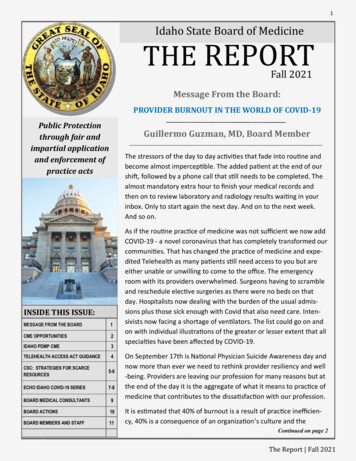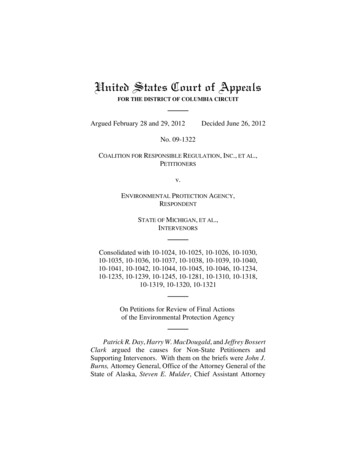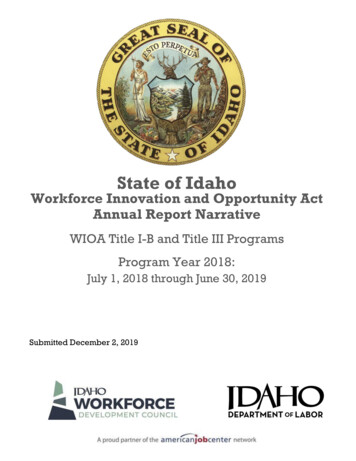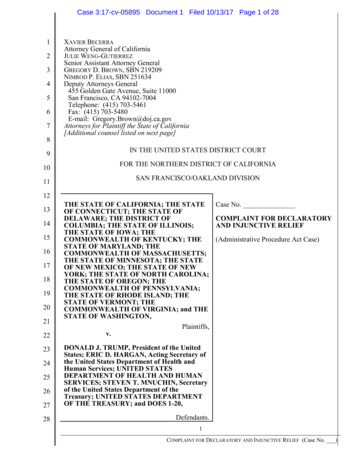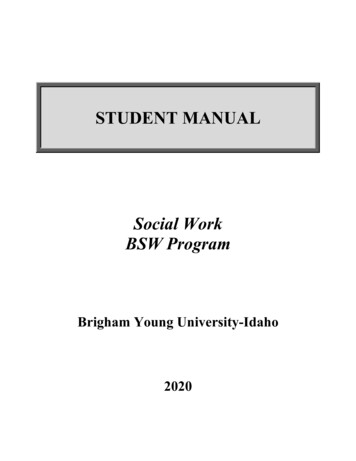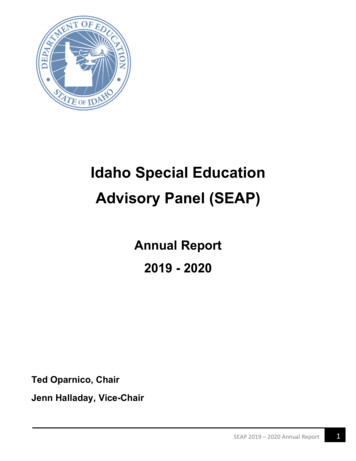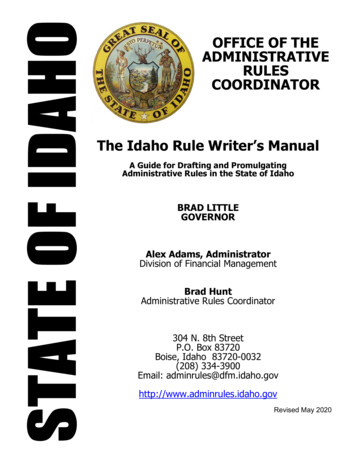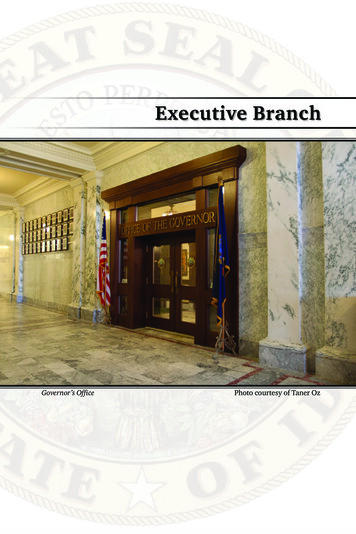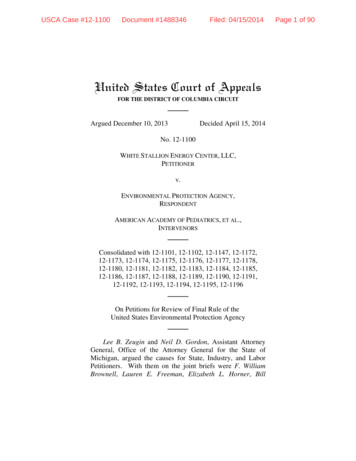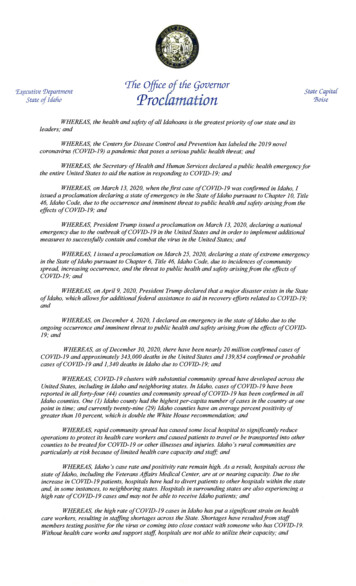
Transcription
IDAHOATTORNEYGENERACSANNUAL REPORTOPINIONSANDSELECTED INFORMALGUIDELINESFOR THE YEAR1986J m JonesAttorney GeneralPrinted by The Caxton Printers, Ltd.Caldwell, Idaho
CONTENTSRoster of Attorneys General of Idaho . . . . . . . . . . . . . . . . . . . . . . . . . .vl11troduction . . . . . . . . . . . . . . . . . . . . . . . . . . . . . . . . . . . . . . . . . . . . . .viiRoster of Staff of the Attorney General . . . . . . . . . . . . . . . . . . . . . . . .IOrganizational Chart of the O ffice of the Attorney General . . . . . . . .Official Opinions·- 1986 . . . . . . . . . . . . . . . . . . . . . . . . . . . . . . . . . . .2Topic Index to Opinions . . . . . . . . . . . . . . . . . . . . . . . . . . . . . . . . .95Table of Statutes Cited.99Selected Informal G uidelines-1986 . . . . . . . . . . . . . . . . . . . . . . . . .103Topic Index to Selected Informal Guidelines . . . . . . . . . . . . . . . .205Table of Statutes Cited . . . . . . . . . . . . . . . . . . . . . . . . . . . . . . . . .211iii3
ATTORNEYS GENERAL OF IDAHOGEORGE H . ROBERTS . . . . . . . . . . . . . . . . . . . . . . . . . . . . . . . . . . . 1 89 1 - 1 892GEORGE M. PARSONS . . . . . . . . . . . . . . . . . . . . . . . . . . . . . . . . . . . 1 893- 1 896ROBERT McFARLAND . . . . . . . . . . . . . . . . . . . . . . . . . . . . . . . . . . . 1 897- 1 898S.H. HAYS.1 899-1 900FRANK MARTIN . . . . . . . . . . . . . . . . . . . . . . . . . . . . . . . . . . . . . . . . 1 90 1 - 1 902JOHN A. BAGLEY . . . . . . . . . . . . . . . . . . . . . . . . . . . . . . . . . . . . . . . 1 903- 1 904JOHN GUHEEN. . . . . . . . . . . . . . . . . . . . . . . . . . . . . . . . . . . . . . . . . 1 905- 1 908D. C. McDOUGALL . . . . . . . . . . . . . . . . . . . . . . . . . . . . . . . . . . . . . . . 1 909- 1 9 1 2JOSEPH H . PETERSON . . . . . . . . . . . . . . . . . . . . . . . . . . . . . . . . . . . 1 9 1 3- 1 9 1 6T. A. WALTERS . . . . . . . . . . . . . . . . . . . . . . . . . . . . . . . . . . . . . . . . . . 1 9 1 7- 1 9 1 8ROY L . BLAG( . . . . . . . . . . . . . . . . . . . . . . . . . . . . . . . . . . . . . . . . . . 1 9 1 9- 1 922A. H. CONNER. . . . . . . . . . . . . . . . . . . . . . . . . . . . . . . . . . . . . . . . . . 1 923- 1 9 26FRANK L. STEPHAN . . . . . . . . . . . . . . . . . . . . . . . . . . . . . . . . . . . . . 1 927- 1 928W. D. GILLIS . . . . . . . . . . . . . . . . . . . . . . . . . . . . . . . . . . . . . . . . . . . . 1 929- 1 930FRED J . BABCOCK . . . . . . . . . . . . . . . . . . . . . . . . . . . . . . . . . . . . . . . 1 93 1 - 1 9 32BERT H. MILLER . . . . . . . . . . . . . . . . . . . . . . . . . . . . . . . . . . . . . . . . 1 933- 1 936J. W. TAYLOR . . . . . . . . . . . . . . . . . . . . . . . . . . . . . . . . . . . . . . . . . . . . 1 937- 1 940BERT H. MILLER . . . . . . . . . . . . . . . . . . . . . . . . . . . . . . . . . . . . . . . . 1 94 1 - 1 944FRANK LANGLEY . . . . . . . . . . . . . . . . . . . . . . . . . . . . . . . . . . . . . . . 1 945- 1 946ROBERT AILSHIE (Deceased November 1 6) . . . . . . . . . . . . . . . . . . 1 947ROBERT E. SMYLIE (Aµpointed November 24). . . . . . . . . . . . . . . 1 947-1 954GRAYDON W. SMITH . . . . . . . . . . . . . . . . . . . . . . . . . . . . . . . . . . . . 1 955- 1 958FRANK L. BENSON . . . . . . . . . . . . . . . . . . . . . . . . . . . . . . . . . . . . . . 1 959- 1 962ALLAN G. SHEPARD . . . . . . . . . . . . . . . . . . . . . . . . . . . . . . . . . . . . . 1 963- 1 968ROBERT M. ROBSON . . . . . . . . . . . . . . . . . . . . . . . . . . . . . . . . . . . . 1 969W. ANTHONY PARK . . . . . . . . . . . . . . . . . . . . . . . . . . . . . . . . . . . . . 1 970- 1 974WAYNE L. KIDWELL . . . . . . . . . . . . . . . . . . . . . . . . . . . . . . . . . . . . . 1 975- 1 978DAVID H. LEROY . . . . . . . . . . . . . . . . . . . . . . . . . . . . . . . . . . . . . . . . 1979- 1 982JIM JONES . . . . . . . . . . . . . . . . . . . . . . . . . . . . . . . . . . . . . . . . . . . . . . 1 983-v
Jim JonesAttorney Generalvi
INTRODUCTIONThis volume contains the official opinions issued by the Office of the AttorneyGeneral during calendar year 1986. Also included are some of the more significantinformal guidelines issued by the office durin g the year. Publication is made pursuantto l.C. § 67-1401 (6).The opinions and guidelines compiled in thi.' volume are designed to provide legalguidance to all governmental entities, as well as the general public. They representmany long hours of research by a dedicated s ta ff and I believe them t0 be of high qual ity. Each year we strive to make this publication more useful to its readers and tomake our work product more readily available.In 1 985 the opinions were made available on the Lexis and Westlaw AutomatedResearch Systems. During the 1987 legislative session legislation was approved re quiring formal attorney general opinions issued after January l, 1983, to be refer enced in future publications of the Idaho Code. Since the opinions do have some pre cedenti.al value and since they play a large part in shaping administrative policy andlegislative action, it is appropriate that lawyers and jurists have better access to themthrough the code annotations.We strive to make this publication a valuable research and reference tool. Com ments of our users are encouraged and are always more than welcome.JIM JONESATTORNEY G EN ERALvii
ANNUAL REPORT OF THE ATTORNEY GENERALOFFICE OF THE ATTORNEY GENERALAs of December 3 1 , 1 986ADMINISTRATIVEJim Jones - Attorney GeneralJohn J. McMahon - Chief DeputyPatrick J. Kole- Legislative AffairsP. Mark Thompson - Civil LitigationLynn E. Thomas - Solicitor GeneralKim Klohe - Business ManagerLois Hurless - Office AdministratorTresha Griffiths - Executive SecretaryDIVISION CHIEFSMichael DeAngelo - H ealth & WelfareD. Marc Haws - C riminal LawDavid G. High - Business Regulations & FinanceDaniel G. Chadwick - Intergovernmental Affairs (Acting)Clive J. Strong - Natural ResourcesDEPUTYATTORNEYSGENERALBrenda AlbertKen ArmentLaura ArmentJames BairdDavid BarberRobert BeckerJo BeemanCarol BrasseyDan ChadwickRon CostonC. A. DawLarry DunnElaine EberharterMary FeenyWarren FeltonRene' FitzpatrickCurt FransenRobert GatesMichael GilmoreLeslie GoddardStephen GoddardFred Goodenoug hJeanne GoodenoughPatti GuerinMike HendersonDon HowellRinda JustDean KaplanDeborah KristalJanice KroegerLynn Krogh-HampeRoger MartindaleSusan MattosMark MimuraDavid MinertSteven ParryShad PriestPhillip RassierPeter RichardsonJohn RuebelmannMarilyn ScanlanSteven SchusterMike SheeleyBrent SmallMarsha S mithTed SpanglerMyrna StahmanThomas SwinehartDiane TappenEvelyn ThomasCraig TruebloodLarry WeeksWill WhelanJim WickhamTim WilsonScott WolfleyScott WoodburyINVESTIGATIVE SERVICEAllan J. CerialeRussell T. Reneau - Chief InvestigatorRichard T. LeGallGarry CarrNON-LEGAL PERSONNELJeanne BaldnerKriss BivensKaren BolianKathy BonhamMarilyn FreemanDeborah LancasterPaula LundElsie O'LearySigrid Obenchai nSandra D. Rich1Jackie SheltonRuth SwanPam WarrenStephanie WibleDeborah W illiams
ORGANIZATION CHART - Office of the Attorney GeneralCHIEFDEP CHIEF OFLEGISLATIVEAFFAIRS1r-----SOLICITOR GENERALCAPITAL LITIGATIONSPECIALISTIr:::0m""O0CHIEF OFCIVIL LITIGATIONIIIIIIII RCES;!:;[TlIIICRIMINAL APPEALS zzc: RAL OFFICELOCAL GOVERNMENTSELF-GOVERNINGAGENCI E NCEP.E.R.S.I.TAXlDEPARTME1'TOF LANDSlDIVISION OFENVIRONMENTHEALTH & t GEMENTSERVICESFISH & GAMEIIPARKS &RECREATIONlWATER RESOURCESIIIIIEMPLOYMENTHUMAN ONMENTPUBLIC UTILITIESCOMMISSION d:;oLm- 0mzm:::0 r
OPINIONS OF THE ATTORNEY GENERAL86-1ATTORNEY GENERA L OPINION NO. 86-1TO:Mrs. Delores CrowIdaho State Representative203 1 1 th Avenue South ExtensionNampa, Idaho 8365 1Per request for Attorney General's Opinion.QUESTION PRESENTED:Is it constitutionally permissible to restrict the use of the word "accountant" andother labels or titles to individuals who have been certified and licensed by the IdahoState Board of Accountancy, as required by Idaho Code § 54-201 , et seq.?CONCLUSION:Yes. It is constitutional under the first and fourteenth amendments of the UnitedStates Constitution and under article I, §§ I, 9, 1 3 of the Idaho State Constitution.The state in exercise of its police powers may regulate the profession of accounting asset forth in LC. § 54-201 et seq., and require licensing of "certified public accoun tants" and "public accountants" as defined in that chapter. The state may also restrictthe use of the term "accountant" or other labels or terms to those who are licensed bythe State Board of Accountancy.ANALYSIS:L Statutory AuthorityTitle 54, chapter 2 of the Idaho Code, known as The Accountancy Act, regulatesthe profession of accounting and creates the Idaho State Board of Accountancy andthe Public Accountant's Advisory Committee. It creates a two-tier licensing systemfor "certified public accountants" and "public accountants." By definition, all mem bers of these classes must hold a valid, unrevoked and un:;uspended certificate and/ orlicense under this chapter. LC. § 54-206. The profession of "public accountant" is a"dying class," meaning that since July I, 1977, with limited exceptions that have nowexpired, the class of licensed public accountant has been closed to new applicants. LC.§ 54-214.The section that directly concerns the question presented is § 54-21 8 . Subsections(!) and (2) restrict the use of the terms "certified public accountant" and "public ac countant" to licensed persons. Subsectio11 (3) states:No person, partnership or corporation shall assume or use the title or desig nation "certified accountant," "chartered accountant," "enrolled account ant," "licensed accountant," "registered accountant," "accredited account ant," "accountant," "auditor or other title or designation or any of the abbre viations "CA," "EA," "RA," or "LA," or similar abbreviations likely to beconfused with "certified public a ountant" or "public accountant"; . . .5
86-1OPINIONS OF THE ATTORNEY GENERALThus, the Idaho Legislature has restricted to licensed persons the use of titles con taining the word "accountant" or "auditor," as well as the use of these words them selves. There shall be no profession of unlicensed accountants in the state, with theexceptions noted in subsection (3), to be discussed later.Subsection ( 4) similarly provides that only a licensed person may render opinionsor perform attestation as an accountant or auditor.Similar restrictions regarding the titles and functions of accountants have existedfor nearly 70 years. The Idaho State Board of Accountancy was established in 1917 toissue certificates to practice as a certified public accountant "and no other personshall be permitted to assume and use such title, or to use any words, letters or figuresto indicate that the person using the same is a certified public accountant." 1917 Ida ho Session Laws, ch. 1 26, § 3. Similar language was retair1ed in the law until a newchapter was enacted in 1974 stating that no person shall assume or use the titles of"certified public accountant," or "public accountant" or the letters "C.P.A." in con nection with his name or business in this state without holding a valid, unrevoked andunsuspended certificate issued or recognized by the board. 1974 Idaho Session Laws,ch. 263, § 54-21 8 . In 1 976, when the licensing of "public accountants" was writteninto the law as a dying class, the more specific and restrictive use-of-title languagethat we have today was added to § 54-218 (3).Idaho is not unique in its regulatory scheme. Accountancy laws governing the li censing of professional accountants have been enacted in all fifty states, the Districtof Columbia, Guam, Puerto Rico and the United States Virgin Islands. Certifiedpublic accountants (CPAs) are licensed in all states. Forty-seven (47) states, as wellas the District of Columbia, Guam, Puerto Rico and the United States Virgin Islands,have regulatory accountancy laws that restrict to licensees the use of the titles "Cer tified Public Accountant," "Public Accountant," and other similar titles, and thatregulate the performance of specific professional accounting services. Digest of StateAccountancy Laws and State Board Regulations, 1985, published jointly by theAmerican Institute of Certified Public Accountants, luc. and the National Associa tion of State Boards of Accountancy.II. Fourteenth Amendment: Due Process and Equal ProtectionThe question addressed in this opinion deals mainly with the constitutional limitsupon the state's authority to license and thereby to regulate certain professions, in cluding accounting. This authority is grounded in the police power, which is the in tri.1sic power of the state to protect the health, safety and general welfare of its people.Jones v. State Board of Medicine, 97 Idaho 859, 868, 555 P.2d 399 ( 1976) cert. de nied 431 U.S. 914, 97 S.Ct. 2173, 5 3 L.Ed.2d 1 23 (1977); Comprehensive AccountingService Co. v. Maryland State Board ofPublic Accountancy, 284 Md. 474, 397 A.2d10 1 9 (1979); Heller v. Abess, 134 Fla. 6 10, 184 So. 122 (1938); Montejano v. Rayner,33, F.Supp. 435 (D. Idaho 1 939); Dent v. West Virginia, 1 29 U.S. 1 14, 1 22, 9 S.Ct. 231,233 , 3 2 L.Ed. 623 (1889).There have been no cases in Idaho interpreting § 54-21 8 or other sections of theAccountancy Act, but the Idaho Supreme Court has upheld similar professional Ii6
OPINIONS O F THE ATTORNEY GENERAL86-1censing requirements in the field of medicine when challenged b y persons in the fieldof naturopathy, an unlicensed occupation. State v. Kellogg, 1 0 2 Idaho 628, 636 P.2d750 (1981);State v. Kellogg, 98 Idaho 541, 568 P.2d 5 14 (1977) ; State v. Maxfield, 98Idaho 356, 564 P. 2d 968 (197 7 ) .Under the fourteenth amendment o f the United States Constitution, and art. I.§ § 1and 1 3 of the Idaho Constitution, challenges to police power regulations such as thosefound in The Accountancy Act may be made on a number of b ases. Challenges maybe made that such regulations interfere with the liberty and p roperty interests pro tected by the due process clauses of both constitutions and that a classification estab lished by the regulation violates the equal protection clause of the U.S. C onstitution.The standard to measure a violation under any of these constitutional grounds is thesame: the law or rule complained of need only bear a rational relationship to a legiti mate legislative purpose. Bint v. Creative Forest Products, 108 Idaho 1 16, 697 P.2d8 1 8 ( 1 985). Minnesota v. Clover Leaf Creamery, 449 U.S. 456, 101 S .Ct. 7 1 5 , 66L.Ed.2d 659 (198 1 ) ; Nebbia v. New York, 291 U.S. 502, 537, 54 S.Ct. 5 05, 516, 78L.Ed. 940 (1934).The rational relation standard of review receives near unanimous acceptance to day. Cases from the 1 920's that allowed the unlicensed use of the term " accountant,"and found its restriction unconstitutional on due process a nd equa l protectiongrounds, reflected the courts' i nterventionist views of that era. See, State v. Riedell,109 Okla. 35, 233 P. 684 (1924); Frazer v. Shelton, 320 Ill. 2 5 3 , 150 N.E. 696 (1926).The views of the 1920's changed direction in the 1 934 U.S. Supreme Court case ofNebbia, supra, which espoused the rational relation standard. See also, Williamson v.Lee Optical, 348 U.S. 483, 75 S .Ct. 461 , 99 L.Ed. 563 (195 5 ) . Under this standard,courts have routinely upheld the constitutionality of statutes r egulatin g accountantsagainst challenges that such statutes violate fourteenth amendment rights to dueprocess and equal protection. Texas State B oard of Public Accountancy v. Fulcher,515 S.W.2d 950 (Tex. Civ. App. 1974); Comprehensive Accounting Service, supra. Itis our opinion that a challenge to the Idaho accountancy statute on similar groundswould likewise be dismissed as lacking in merit.III. First Amendment and Commercial Speech:This opinion also addresses the issue of a possible constit utional violation of freespeech under the first amendment of the United States Constitution and art. I, § 9 , ofthe Idaho Constitution. While there is little doubt that The Accoun tancy Act , §54-201 et seq., is constitutional on due process and equal protection grounds, the ques tion is closer when the Act is tested for violation of free speech because the standard ofreview is different than in the due process/equal protection areas.Protection of commercial speech is a recent development i n constitutional jurispru dence. In Central Hudson Gas v. Public Service Commission, 447 U.S. 5 5 7, l 00 S .Ct.2343, 65 L.Ed.2d 341 (1980), the United States Supreme Court defined commercialspeech as "expression related solely to the economic interests of the s peaker and itsaudience." The cornerstone of commercial speech is the disseminatio n of informa tion. The ability to hold oneself out and advertise in an occupational area such as ac7
86-1OPINIONS OF THE ATTORNEY GENERALcounting meets this definition. Such speech enjoys protection under the first amend ment of the United States Constitution. See, Virginia Pharmacy Board v. VirginiaConsumer Council, 425 U.S. 748, 765, 96 S.Ct. 1 8 1 7, 1827, 48 L.Ed.2d 346 (1 976).As with other forms of speech, however, commercial speech may justifiably be reg ulated or even suppressed in certain situations. In fact, the protections afforded com mercial speech are somewhat less than other forms of speech . Zaunderer v. Office ofDisciplinary Counsel, 471 U.S. 626, 105 S.Ct. 2265, 8 5 L.Ed.2d 652 (1985); Bolger v.Young Drug Products Corp., 463 U.S. 60-65, 103 S.Ct. 2875, 2879, 77 L.Ed.2d 469(1983); Metromedia, Inc. v. San Diego, 453 U.S. 490, 506, 101 S.Ct. 2882, 2892, 69L.Ed.2d 800 (198 1 ) , Central Hudson, supra at 562-63.In determining the validity of government restrictions on commercial speech, afour-part ti st was enunciated in Central Hudson, supra:At the outset, we must determine whether the expression is protected by theFirst Amendment. For commercial speech to come within that provision, itat least must concern lawful activity and not be misleading. Next, we askwhether the asserted governmental interest is substantial. If both inquiriesyield positive answers, we must determine whether the regulation directlyadvances the governmental interest asserted, and whether it is not more ex tensive than is necessary to serve the interest. 447 U.S. at 566, 1 00 S.Ct. at235 1 .Because Idaho has no commercial speech cases t o guide us, we will apply the testlaid out in Central Hudson, look at other statements of the United States SupremeCourt and see what other sources have said on the issue.The first inquiry mandated by Central Hudson is whether the commercial speechin question is misleading, i.e., whether use of the title "accountant" by unlicensed per sons would mislead the public.Idaho has a two-tier licensing system for "certified public accountants" and "pub lic accountants." It is not difficult to imagine that the public could be misled if per sons who were unlicensed could use the most basic term of the profession of account ing, i.e. "accountant." Even a sophisticated person likely does not know what func tions the state allows only a licensed accountant to perform. As the law presentlystands, one may be assured that if a person holds himself an "accountant" the personhas been licensed by the state and has thus met certain educational and examinationrequirements. Third parties relying on financial compilations, reviews and audits alsohave this assurance. Thus, the Idaho law protects the public from confusing or mis leading representations.Assuming, however, that the use of the term "accountant" by unlicensed persons isnot misleading or deceptive, do the Idaho Accountancy Act restrictions, § 54-201 etseq., falter on one or more of Central Hudson's remaining grounds of analysis? Is thegovernmental interest substantial and does it directly advance the interest asserted?On these two grounds, the answers appear to be "yes."8
OPINIONS OF THE ATTORNEY GENERAL86-1Clearly, the governmental interest at stake is "substantial," as required by the sec ond test in Central Hudson. The financial harm that incompetent or unscrupulouspractitioners may inflict upon the general public was expressed by Arizona's Officeof Auditor General, in an August 1 979 report to the Arizona Legislature at p. 33:The critical nature of the financial audit stems from the reliance others placeon its accuracy and completeness and the independence of the auditor. Au dited financial statements are a primary means of communicating financialinformation to those outside an entity. . . . Persons outside the organizationrely on audited financial statements to be accurate, complete and factual.Audited financial statements are intended to provide information that is use ful in making business nd economic decisions. Indiv iduals, enterprises,markets and governments in making decisions use audited financial state ment information to evaluate various alternatives and assess the expected re turns, costs and risks.Just as clearly, the third part of the Central Hudson test is met, i.e., the govern ment's regulation of the title "accountant" directly advances the governmental inter est asserted. By prohibiting the use of the title "accountant" or similar titles by thosewho are not "certified public accountants" or "public accountants," the legislatureprotects the public from the confusion and uncertainty that results when an un licensed person uses terms that may lead one to believe such person possesses the skillsand qualifications of the licensed person. The legislature in its statement of legislativeintent in § 54-202 said this legislation was necessary "to the end that the public shallbe properly protected against u nprofessional, improper, unauthorized and un qualified practice as a certified public accountant or public accountant. . . "The legislature saw that today's business climate is becoming increa:;ingly com plex. Such a situation increases the public interest in thP: reliability l!;1u ··;·edibility ofthose with whom the public must deal, and just as importantly, wiH1 those upon whoseinformation the public must rely. When the information is important, and the confu sion from use of like terms is subject to misunderstanding, the tight restriction of pro fessional titles by the state is reasonable. The licensing requirement thus directly ad vances a substantial governmental interest.The fourth and final question under the Central Hudson test of the analysis is theissue of whether the regulation is more extensive than necessary to serve the interestof the state. In looking at § 54-218(3), it is important to note that the statute does notcompletely forbid the use of the term "accountant." It provides these exceptions:. . . provided, that the provisions of this subsection shall not prohibit any of ficer, employer, partner or principal of any organization from using the des ignations accountant or auditor in reference to any wording designating theposition, title or office which he holds in said organization nor shall the provi sions of this subsection prohibit the use of the designations accountant or au ditor by any public officials or public employee in reference to his publicposition, title or office.9
86- 1OPINIONS OF THE ATTORNEY GENERALThe txceptions are not insignificant. This part of § 54-218(3) allows the use of theterm "accountant" by unlicensed persons working for any private organization or inany public position. These are two areas in which little confusion would arise. Simi larly, a person is free to advertise and to hold himself out in such unregulated occupa tions as bookkeeping and tax preparation. It is only the holding out of oneself as an"accountant" that requires a license under Idaho law.It is our opinion, therefore, that the regulation of commercial speech by The Ac countancy Act is constitutional under the four-part test of Central Hudson. The useof the term "accountant" by unlicensed persons is likely to mislead the public. Thegovernment has a substantial interest in protecting the public from such misleadingrepresentation. Requiring that persons who hold themselves out to the public as "ac countants" be licensed is a direct and reasonable means of attaining this goal. Idaho'sregulatory scheme is not more extensive than is necessary to serve its valid purposes.Only two cases have been found that address the question of whether use of theterm "accountant" by unlicensed persons is protected commercial speech under thefirst amendment.In Comprehensive Accounting Service, sup1 a, the Maryland S upreme Courtfound a ban on tl:e use of the word "accountant" by unlicensed persons to be uncon stitutional. Comprehensive Accounting Service was part of a nationwide network of150 franchises serving 1 5,000 clients throughout the country. It advertised that itwould "undertake all the bookkeeping, accounting, systems work, and permanentrecords for taxes for the business . . . . " (emphasis in original). 397 A .2d at 102 1 . Itmaintained it could provide essential accounting services to smaller busines es at rea sonable prices using specialized, mass-production methods that allowed it to furnishmonthly financial statements and a tax preparation service. Comprehensive did notrepresent that it conducted "audits" or "examinations," nor did it furnish written cer tificates or opinions concerning the correctness of financial statements, schedules, re ports or exhibits which it prepared.Maryland's statute was not a model of clarity. It forbade the unlicensed use of theterms "accountant" or "auditor" but it failed to define public acounting. The courtalso stated that the statute provided language of exception which said that nothing inthe statute should be construed to prohibit any person from:Offering or rendering to the public bookkeeping and tax services, includingdevising and installing systems, recording and presentation of financial in formation or data, preparing financial statements, schedules, reports and ex hibits, or similar services; . . Id. at 1020.The court said that this exception in the statute allowing persons to perform certainfunctions could not be reconciled with a ban on advertising the fact that they perform ed those services:Thus § 15(e) expressly authorizes an uncertified accountant to perform ac counting services to the public, while at the same time § 14(e) prohibits himfrom describing those services to the publk as accounting, or holding himselfout to the public as an accountant. Id. at 1 023.10
OPINIONS OF THE ATTORNEY GENE RAL86-1Idaho does not have a statute with language of exception comparable to the Mary land statute.The court in Comprehensive stated t hat even though commercial speech which ismisleading or deceptive may be restrai ned, the legislature cannot choose the mostdrastic remedy of complete suppression of the use of certain words in order to preventpublic confusion and deception. Id. at 1026-1027, citing Beneficial Corporation v.F.T.C., 542 F.2d 6 1 1 (3d Cir. 1 976), cert. denied, 430 U.S. 983, 97 S .Ct. 1679, 5 2L.Ed.2d 377 (1977). The court said:As there has been no showing by the state that a compelling need underliesthe enactment of § 1 4 (e), that provision violates Comprehensive's firstamendment free speech rights. ( Emphasis added.)In reaching this conclusion, the Maryland court did not have the benefit of the stan dards laid down in Central Hudson, 44 7 U.S. 557, 566, 100 S.Ct. 2343, 65 L.Ed.2d341 (1980). In that case, the United States Supreme Court stated that the govern mental interest must be "substantial." The Supreme Court did not require a showingby the state of a "compelling need" in order to regulate in the commercial speech area.The case of Fulcher v. Texas State Board ofPublic Accountancy, 5 7 1 S. W.2d 366(Tex. Civ. App. 1978), upheld the constitutionality of the Texas statute. The courtaddressed the issue of whether Fulcher, an unlicensed person, had violated the Texasstatutes by representing himself as providing "accounting" services on the door to hisoffice and in announcements sent concerning his new office; on his card, letterheadand envelopes; and on his tax form covers. The Texas statutes required both a licensefor the person and the registration of his or her office(s) to practice public accountingand only a person who did both, "may hold himself out to the public as an 'accountant'or 'auditor' or combination of said terms." Id. at 369.The Texas court said that the statutes evidenced a legislative intent to prevent anyunlicensed person from holding himself out as having expert knowledge and thatFulcher did so hold himself out. It said such conduct was misleading and remai nedsubject to restraint u nder Bates v. State Board of Arizona, 433 U.S. 3 50, 383, 9 7S.Ct. 269 1 , 5 3 L.Ed.2d 8 1 0 ( 1977). I n accord with t h e Fulcher decision, although noton constitutional grounds, is People v. Hill, 66 Cal .App.3d 3 24, 136 Cal. Rptr. 30(1977).A Nebraska Attorney General Opinion, No. 339, December 12, 1980, found theNebraska statute requiring an affirmative disclosure of the fact that an accountant isnot licensed to be constitutional. Regarding a total ban of the use of the terms, theopinion said:We believe it could be effectively argued that the unrestricted use of the titles"Accountant" or "Auditor" by an unlicensed person could in fact cause con fusion which would be detrimental to the public and therefore the state reg ulation of those terms is rationally related to a legitimate state i nterest. Sincethe "speech" at issue here is "commercial," it is subject to "reasonable reg ulation that serves a legitimate public interest." Bigelo
Michael DeAngelo - Health & Welfare D. Marc Haws - Criminal Law David G. High - Business Regulations & Finance Daniel G. Chadwick - Intergovernmental Affa irs (Acting) Clive J. Strong - Natural Resources Brenda Albert Ken Arment Laura Arment James Baird David Barber Robert Becker Jo Beeman Carol Brassey Dan Chadwick Ron Coston C. A. Daw Larry Dunn
